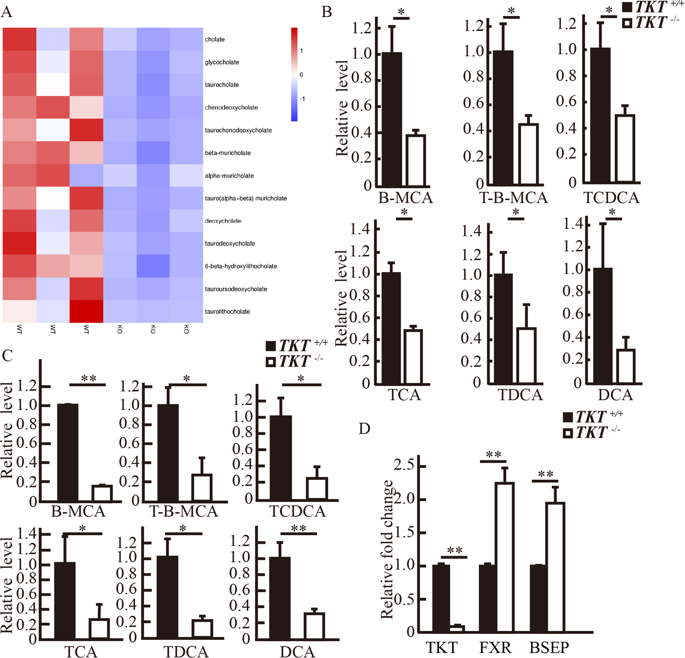当前位置:
X-MOL 学术
›
Cell Death Dis.
›
论文详情
Our official English website, www.x-mol.net, welcomes your feedback! (Note: you will need to create a separate account there.)
The nuclear translocation of transketolase inhibits the farnesoid receptor expression by promoting the binding of HDAC3 to FXR promoter in hepatocellular carcinoma cell lines.
Cell Death & Disease ( IF 9 ) Pub Date : 2020-01-16 , DOI: 10.1038/s41419-020-2225-6 Minle Li 1, 2 , Xuping Zhang 1, 2 , Ying Lu 3 , Sen Meng 1, 2 , Haoyu Quan 1, 2 , Pingfu Hou 1, 2 , Pan Tong 4 , Dafei Chai 1, 2 , Xiaoge Gao 1, 2 , Junnian Zheng 1, 2, 5 , Xuemei Tong 3 , Jin Bai 1, 2
Cell Death & Disease ( IF 9 ) Pub Date : 2020-01-16 , DOI: 10.1038/s41419-020-2225-6 Minle Li 1, 2 , Xuping Zhang 1, 2 , Ying Lu 3 , Sen Meng 1, 2 , Haoyu Quan 1, 2 , Pingfu Hou 1, 2 , Pan Tong 4 , Dafei Chai 1, 2 , Xiaoge Gao 1, 2 , Junnian Zheng 1, 2, 5 , Xuemei Tong 3 , Jin Bai 1, 2
Affiliation

|
Transketolase (TKT), which is a metabolic enzyme in the nonoxidative phase of the pentose phosphate pathway (PPP), plays an important role in providing cancer cells with raw materials for macromolecular biosynthesis. The ectopic expression of TKT in hepatocellular carcinoma (HCC) was reported previously. However, the role of TKT in the initiation of liver cancer is still obscure. In our previous study, we found that TKT deficiency protects the liver from DNA damage by increasing levels of ribose 5-phosphate and nucleotides. What's more interesting is that we found TKT deficiency reduced bile acids and loss of TKT promoted the farnesoid receptor (FXR) expression. We further showed that TKT translocated into the nucleus of HCC cell lines through interacting with the signal transducer and activator of transcription 1 (STAT1), and then the complex inhibited FXR expression by promoting the binding of histone deacetylase 3 (HDAC3) to FXR promoter.
中文翻译:

通过促进肝细胞癌细胞系中HDAC3与FXR启动子的结合,转酮醇酶的核易位抑制法呢素受体的表达。
转酮醇酶(TKT)是戊糖磷酸途径(PPP)的非氧化相中的一种代谢酶,在为癌细胞提供大分子生物合成原料方面起着重要作用。TKT在肝细胞癌(HCC)中的异位表达已有报道。但是,TKT在肝癌的发生中的作用仍然不清楚。在我们先前的研究中,我们发现TKT缺乏症会通过增加5核糖核糖和核苷酸的含量来保护肝脏免受DNA损伤。更有趣的是,我们发现TKT缺乏症降低了胆汁酸,而TKT的丧失促进了法呢素受体(FXR)的表达。我们进一步表明TKT通过与信号转导子和转录激活因子1(STAT1)相互作用而转移到HCC细胞系的核中,
更新日期:2020-01-16
中文翻译:

通过促进肝细胞癌细胞系中HDAC3与FXR启动子的结合,转酮醇酶的核易位抑制法呢素受体的表达。
转酮醇酶(TKT)是戊糖磷酸途径(PPP)的非氧化相中的一种代谢酶,在为癌细胞提供大分子生物合成原料方面起着重要作用。TKT在肝细胞癌(HCC)中的异位表达已有报道。但是,TKT在肝癌的发生中的作用仍然不清楚。在我们先前的研究中,我们发现TKT缺乏症会通过增加5核糖核糖和核苷酸的含量来保护肝脏免受DNA损伤。更有趣的是,我们发现TKT缺乏症降低了胆汁酸,而TKT的丧失促进了法呢素受体(FXR)的表达。我们进一步表明TKT通过与信号转导子和转录激活因子1(STAT1)相互作用而转移到HCC细胞系的核中,



























 京公网安备 11010802027423号
京公网安备 11010802027423号